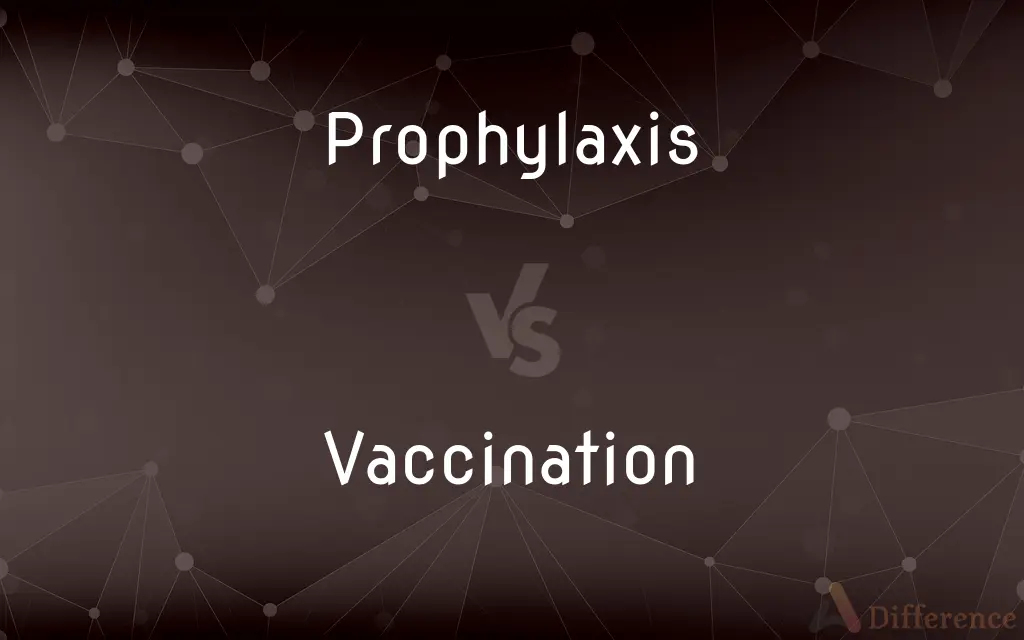Prophylaxis vs. Vaccination — What's the Difference?
Edited by Tayyaba Rehman — By Urooj Arif — Updated on March 29, 2024
Prophylaxis encompasses a range of preventive measures against disease, including hygiene practices and medication. Vaccination is a specific form of prophylaxis that involves administering a vaccine to stimulate an immune response.

Difference Between Prophylaxis and Vaccination
Table of Contents
ADVERTISEMENT
Key Differences
Prophylaxis represents a broad category of preventative health measures designed to ward off diseases before they occur. It includes a wide array of actions, such as the use of condoms to prevent transmitted infections, taking antimalarial drugs when traveling to high-risk areas, and maintaining good hygiene practices. Vaccination, however, is a specialized form of prophylaxis focused on immunization against specific pathogens. It involves introducing a vaccine into the body to encourage the immune system to develop defenses against future infections by that pathogen.
While prophylaxis can be general or specific in nature, vaccination is inherently specific, targeting particular diseases such as measles, influenza, or COVID-19. Prophylactic measures can vary from simple lifestyle adjustments to complex medical interventions, depending on the disease being prevented. On the other hand, vaccination is a medical procedure that has been scientifically developed and tested to prevent specific infectious diseases through the development of immunity.
The goals of prophylaxis and vaccination also differ slightly. The primary goal of prophylaxis is to prevent the onset of disease in an individual or population, which can include preventing the spread of infections or minimizing the impact of potential infections. Vaccination aims more narrowly to prevent infectious diseases by inducing immunity, thereby reducing the incidence of specific diseases within the population.
The implementation of prophylactic measures and vaccination campaigns can vary widely. Prophylaxis may involve personal decisions and actions, public health policies, or medical prescriptions. Vaccination, however, typically involves organized health campaigns and is often part of public health policy, requiring extensive coordination and cooperation among healthcare providers, governments, and communities.
The effectiveness of prophylaxis and vaccination can be measured differently. The effectiveness of prophylactic measures may depend on a combination of factors including individual behavior, community practices, and environmental conditions. Vaccination effectiveness is usually measured by the development of immunity in the vaccinated population and the subsequent reduction in disease incidence.
ADVERTISEMENT
Comparison Chart
Definition
Broad preventative measures against disease
Administering a vaccine to stimulate an immune response
Scope
General and specific measures
Specific to immunization against diseases
Purpose
Prevent disease onset and spread
Induce immunity to prevent specific diseases
Implementation
Varies widely (lifestyle changes, medication)
Organized health campaigns, public policy
Effectiveness
Dependent on behavior, community practices
Measured by immunity development and disease reduction
Compare with Definitions
Prophylaxis
It can include the use of drugs to prevent infection.
Travelers to malaria-prone regions often take antimalarial drugs as prophylaxis.
Vaccination
Vaccination programs are crucial in eradicating diseases.
The polio vaccination campaign has nearly eradicated the disease worldwide.
Prophylaxis
Dental prophylaxis involves cleaning to prevent gum disease.
Routine dental visits for prophylaxis can prevent cavities and gingivitis.
Vaccination
Vaccinations can be mandatory for school entry.
Children must receive certain vaccinations before starting school.
Prophylaxis
Prophylaxis can be a lifestyle choice to reduce disease risk.
Regular exercise is considered cardiovascular prophylaxis.
Vaccination
It specifically targets infectious diseases.
Measles vaccination has drastically reduced disease incidence.
Prophylaxis
Prophylaxis involves preventative measures to protect against disease.
Handwashing is a simple but effective form of prophylaxis.
Vaccination
Booster shots are part of vaccination protocols.
Tetanus vaccination requires a booster every 10 years.
Prophylaxis
Prophylaxis may involve environmental measures.
Using mosquito nets is a form of prophylaxis against mosquito-borne diseases.
Vaccination
Vaccination is the process of administering a vaccine to build immunity.
The flu vaccination is recommended annually.
Prophylaxis
Prevention of or protective treatment for disease.
Vaccination
Vaccination is the administration of a vaccine to help the immune system develop protection from a disease. Vaccines contain a microorganism or virus in a weakened, live or killed state, or proteins or toxins from the organism.
Prophylaxis
(medicine) Prevention of, or protective treatment for, disease.
Vaccination
Treatment with a vaccine to produce immunity against a disease; inoculation
If you think you need a flu vaccination, check with your doctor
Vaccination against yellow fever is essential
Prophylaxis
(chess) A move or strategy that frustrates an opponent's plan or tactic.
Vaccination
Inoculation with a vaccine in order to protect against a particular disease.
Prophylaxis
The art of preserving from, or of preventing, disease; the observance of the rules necessary for the preservation of health; preservative or preventive treatment.
Vaccination
A scar left on the skin by vaccinating.
Prophylaxis
The prevention of disease
Vaccination
Inoculation with a vaccine, in order to protect from a particular disease or strain of disease.
Vaccination
The act, art, or practice of vaccinating, or inoculating with the cowpox, in order to prevent or mitigate an attack of smallpox. Cf. Inoculation.
Vaccination
Any inoculation intended to raise immunity to a disease.
Vaccination
Taking a vaccine as a precaution against contracting a disease
Vaccination
The scar left following innoculation with a vaccine
Common Curiosities
What's the difference between prophylaxis and vaccination?
Prophylaxis includes all preventative health measures against disease, while vaccination specifically involves stimulating immunity against particular pathogens.
How does public health implement prophylaxis?
Through education, policies, and programs promoting behaviors and practices that reduce disease risk.
Why is vaccination important in public health?
It prevents the spread of infectious diseases, protecting individuals and communities, and can lead to the eradication of diseases.
Can vaccination be considered a form of prophylaxis?
Yes, vaccination is a specialized form of prophylaxis aimed at inducing immunity to prevent specific infectious diseases.
What are examples of prophylaxis other than vaccination?
Using condoms, taking antimalarial drugs, and maintaining good hygiene are examples of non-vaccination prophylaxis.
How are vaccines developed?
Through research identifying antigens that stimulate the immune response, followed by clinical trials to ensure safety and effectiveness.
Can everyone receive vaccinations?
Most people can, but there are exceptions for those with certain medical conditions; medical advice should be sought.
How do vaccinations prevent disease outbreaks?
By achieving herd immunity, reducing the number of susceptible hosts, and interrupting disease transmission.
Are there prophylactic measures for non-infectious diseases?
Yes, such as lifestyle changes for heart disease prevention or medication to lower risk in high-risk cancer patients.
Is prophylaxis always medical?
No, it can also include lifestyle and environmental measures to prevent disease.
How do booster vaccinations work?
They re-expose the immune system to the immunizing antigen to boost immunity and prolong protection.
Can prophylaxis eliminate the risk of disease?
While it significantly reduces risk, it does not eliminate it entirely for all diseases.
What are the ethical considerations in mandatory vaccination policies?
Balancing individual freedoms with public health benefits and safety.
What is the role of the World Health Organization in vaccination?
It coordinates global health matters, including vaccination campaigns and guidelines.
What is travel prophylaxis?
Precautions taken by travelers to prevent illness while visiting areas with higher risk of certain diseases.
Share Your Discovery

Previous Comparison
Dyslexia vs. Dysgraphia
Next Comparison
Divorcee vs. DivorceAuthor Spotlight
Written by
Urooj ArifUrooj is a skilled content writer at Ask Difference, known for her exceptional ability to simplify complex topics into engaging and informative content. With a passion for research and a flair for clear, concise writing, she consistently delivers articles that resonate with our diverse audience.
Edited by
Tayyaba RehmanTayyaba Rehman is a distinguished writer, currently serving as a primary contributor to askdifference.com. As a researcher in semantics and etymology, Tayyaba's passion for the complexity of languages and their distinctions has found a perfect home on the platform. Tayyaba delves into the intricacies of language, distinguishing between commonly confused words and phrases, thereby providing clarity for readers worldwide.












































